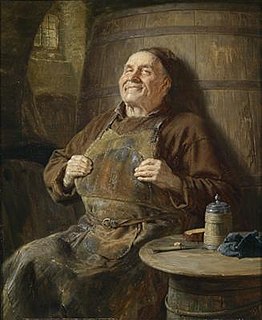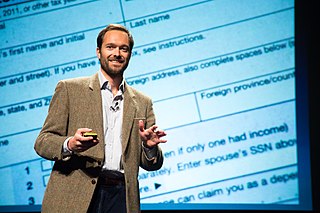
Happiness, in the context of mental or emotional states, is positive or pleasant emotions ranging from contentment to intense joy. Other forms include life satisfaction, well-being, subjective well-being, flourishing and eudaimonia.

Positive psychology is the scientific study of what makes life most worth living, focusing on both individual and societal well-being. It studies "positive subjective experience, positive individual traits, and positive institutions...it aims to improve quality of life." It is a field of study that has been growing steadily throughout the years as individuals and researchers look for common ground on better well-being.

The Satisfaction with Life Index was created in 2007 by Adrian G. White, an analytic social psychologist at the University of Leicester, using data from a metastudy. It is an attempt to show life satisfaction in different nations.
The economics of happiness or happiness economics is the theoretical, qualitative and quantitative study of happiness and quality of life, including positive and negative affects, well-being, life satisfaction and related concepts – typically tying economics more closely than usual with other social sciences, like sociology and psychology, as well as physical health. It typically treats subjective happiness-related measures, as well as more objective quality of life indices, rather than wealth, income or profit, as something to be maximized.
Happy life expectancy (HLE) is calculated by multiplying life expectancy by a happiness index. The first uses life expectancy at birth. The happiness index is the average appreciation of life from the world databases of happiness.
The Easterlin paradox is a finding in happiness economics formulated in 1974 by Richard Easterlin, then professor of economics at the University of Pennsylvania, and the first economist to study happiness data. The paradox states that at a point in time happiness varies directly with income both among and within nations, but over time happiness does not trend upward as income continues to grow. It is the contradiction between the point-of-time and time series findings that is the root of the paradox. Various theories have been advanced to explain the Paradox, but the Paradox itself is solely an empirical generalization. The existence of the paradox has been strongly disputed by other researchers.

Contentment is an emotional state of satisfaction that can be seen as a mental state drawn from being at ease in one's situation, body and mind. Colloquially speaking, contentment could be a state of having accepted one's situation and is a milder and more tentative form of happiness.

The Journal of Occupational Health Psychology is a peer-reviewed academic journal published bimonthly by the American Psychological Association. It "publishes research, theory, and public policy articles in occupational health psychology, an interdisciplinary field representing a broad range of backgrounds, interests, and specializations. Occupational health psychology concerns the application of psychology to improving the quality of work life and to protecting and promoting the safety, health, and well-being of workers." The current editor-in-chief is Sharon Clarke, PhD.

Cretien van Campen is a Dutch author, editor and scientific researcher in social science and fine arts. He is the founder of Synesthetics Netherlands and is affiliated with the Netherlands Institute for Social Research | SCP. He is best known for his work on synesthesia and studies of quality of life.
The International Society for Quality of Life Studies (ISQOLS) is an international, academic organization which promotes research in and measurement of "quality of life."

Subjective well-being (SWB) is a self-reported measure of well-being, typically obtained by questionnaire.
Ruut Veenhoven is a Dutch sociologist and a pioneer and world authority on the scientific study of happiness, in the sense of subjective enjoyment of life. His work on the social conditions for human happiness at Erasmus University Rotterdam in the Netherlands, has contributed to a renewed interest in happiness as an aim for public policy. He has shown that happiness can be used a reliable measure to assess progress in societies which was one of the sources of inspiration for the United Nations to adopt happiness measures as a holistic approach to development. Veenhoven is the founding director of the World Database of Happiness and a founding editor of the Journal of Happiness Studies. He has been described as "the godfather of happiness studies", and "a leading authority on worldwide levels of happiness from country to country", whose work "earned him international acclaim".

Michael W. Fordyce was a psychologist and a pioneer researcher in the field of empirical happiness measurement and intervention. As a forerunner who approached "happiness" as an applied science, he ushered-in the modern academic branch of Positive Psychology
The World Database of Happiness is a web-based archive of research findings on subjective appreciation of life. The database contains both an overview of scientific publications on happiness and a digest of research findings. The database contains information on how happy people are in a wide range of circumstances and in 165 different nations. Happiness is defined as the degree to which an individual judges the quality of his or her life as a whole favorably. Two 'components' of happiness are distinguished: hedonic level of affect and contentment.
Frontiers: A Journal of Women Studies is a triannual peer-reviewed academic journal which figures among the earliest publications in the field of feminist and gender studies in the United States. First published in 1975, at the University of Colorado, Boulder, Frontiers takes pride in its extensive, interdisciplinary agenda concerned with the intersections of the different systems of oppression that produce and reproduce social inequalities and injustices. From 2012 through spring 2017 the journal was edited at Ohio State University, with Guisela Latorre and Judy Tzu-Chun Wu serving as editors-in-chief. As of July 2017 its editorial team is based at the University of Utah's new School for Cultural and Social Transformation, and the editors are Wanda S. Pillow, Kimberly M. Jew, and Cindy Cruz. The aim of the publication is to promote the works of feminist thinkers and theorists.
Denmark has been noted as having one of the lowest income inequality ratings in the world and has been known to maintain relative stability in this metric throughout decades past. The OECD data of 2016 gives Denmark a Gini coefficient of 0.249, below the OECD average of 0.315. The OECD in 2013 ranked Denmark with having a 0.254 Gini coefficient, ranking third behind Iceland and Norway respectively as the countries with the lowest income inequality qualifications. The Gini coefficients are measured using a 0–1 calibration where 0 equals complete equality and 1 equals complete inequality. "Wage-distributive outcomes" and their effect on income equality have been noted since the 1970s and 80s. Denmark, along with other Nordic countries, such as Finland and Sweden, has long held a stable low wage inequality index as well.

John F. Helliwell is a Canadian economist and editor of the World Happiness Report. He is a senior fellow of the Canadian Institute for Advanced Research (CIFAR) and co-director of the CIFAR Programme on Social Interactions, Identity, and Well-Being; Board Director of the International Positive Psychology Association, and professor emeritus of Economics at the University of British Columbia.

Jan-Emmanuel De Neve is a Belgian economist and professor at the University of Oxford where he directs the Wellbeing Research Centre. De Neve is also the KSI Fellow and Vice-Principal of Harris Manchester College. He is best known for his research on the economics of wellbeing which has led to new insights into the relationship between wellbeing and income, productivity, economic growth, and inequality. De Neve is also an editor of the World Happiness Report.
Kenneth Carl Land is the John Franklin Crowell Professor Emeritus of Sociology at Duke University, where he is also a research professor at the Social Science Research Institute. He is also a fellow at the Center for the Study of Aging at Duke University Medical Center and a faculty fellow at the Duke University Center for Child and Family Policy.
Alexandros Charles Michalos is a Canadian political scientist and philosopher known for his work in quality of life research. He is professor emeritus of political science and former chancellor at the University of Northern British Columbia, where he served as the founding director of the Institute for Social Research and Evaluation. Before joining the University of Northern British Columbia, he taught at the University of Guelph from 1966 to 1994. He served as senior research advisor to the Canadian Index of Wellbeing, and continues to serve as a member of their Canadian Research Advisory Group. He served as president of the International Society for Quality-of-Life Studies from 1999 to 2000. He is the founder or co-founder of seven peer-reviewed academic journals, and as of 2010, still served as editor-in-chief of one of them: the Journal of Business Ethics. He was named a member of the Order of Canada in 2010.








